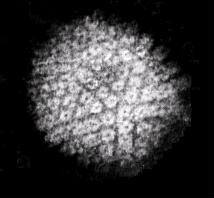Herpes simplex
For patient information on congenital herpes, click here
For patient information on genital herpes, click here
| Herpes simplex | |
 | |
|---|---|
| Electron micrograph of Herpes simplex virus. | |
| ICD-10 | A60, B00, G05.1, P35.2 |
| ICD-9 | 054.0, 054.1, 054.2, 054.3, 771.2 |
| DiseasesDB | 5841 Template:DiseasesDB2 |
| MeSH | D006561 |
|
Herpes simplex Microchapters |
|
Patient Information |
|
Classification |
|
Herpes simplex On the Web |
Editor-In-Chief: C. Michael Gibson, M.S., M.D. [1], Associate Editor-In-Chief: Cafer Zorkun, M.D., Ph.D. [2]
Overview
Pathophysiology
Epidemiology & Demographics
Subtypes
Several distinct disorders are caused by HSV infection of the skin or mucosa including those that affect the face and mouth (orofacial herpes), genitalia (genital herpes), or hands (herpes whitlow). More serious problems arise when the virus infects and damages the eye (herpes keratitis) or invades the central nervous system to damage the brain (herpes encephalitis). Newborn infants, with their under-developed immune systems, are also prone to serious complications due to HSV infection (neonatal herpes).
- Orofacial infection
- Anogenital infection
- Ocular infection
- Herpes Encephalitis
- Neonatal herpes
- Herpetic whitlow
- Herpes gladiatorum
Diagnosis
Mode of Transmission
Asymptomatic shedding | Recurrences and triggers | Transmission and prevention
Treatment
Antiviral Medication | Topical treatments | Other drugs | Vaccines
Psychological and social effects
Since there is currently no cure for herpes, some people experience negative feelings related to the condition following diagnosis, particularly if they have acquired the genital form of the disease. Though these feelings lessen over time, they can include depression, fear of rejection, feelings of isolation, fear of being found out, self-destructive feelings, and fear of masturbation.[1] In order to improve the well-being of people with herpes, support groups have been formed in the United States and the UK, providing supporting communities and information about herpes of message forums and dating websites.[2][3][4][5][6]
People with the herpes virus are often hesitant to divulge to other people, including friends and family, that they are infected. This is especially true of new or potential sexual partners that they consider 'casual'.[7] A perceived reaction is sometimes taken into account before making a decision about whether to inform new partners and at what point in the relationship. Many people choose not to disclose their herpes status when they first begin dating someone, but wait until it later becomes clear that they are moving towards a sexual relationship. Other people disclose their herpes status upfront. Still others choose only to date other people who already have herpes.
Legal redress
Whether the law can help a person who catches herpes depends on the jurisdiction where it was contracted as legal jurisdictions define their own rules regarding the transmission of STIs such as herpes.[8] There can be both criminal and civil possibilities. For example, in the criminal case of R. v. Sullivan heard in England and Wales, an attempt was made to prosecute Sullivan for sexual assault after his partner experienced a primary outbreak of genital herpes, on the basis that he had failed to reveal the fact that he had herpes. The presiding judge dismissed the prosecution case during preliminary hearings, citing inability to prove prior knowledge and the trial did not take place.[9] Civil claims for transmission of herpes are, for their part, usually based on negligence if transmission was accidental and battery if deliberate. The first successful case to allow such a claim in the United States was Kathleen K. v. Robert B., decided by the California Court of Appeals.[10]
References
- ↑ Vezina C, Steben M. (2001). "Genital Herpes: Psychosexual Impacts and Counselling". The Canadian Journal of CME (June): 125–134.
- ↑ Herpes Support Groups & Clinics
- ↑ Herpes Viruses Association - a patient run group
- ↑ Herpes message forum with over 4000 members
- ↑ H-Date, a dating site for persons with either or both of HSV-1 or HSV-2
- ↑ MPwH - Meeting People with Herpes, a dating site with over 65000 members
- ↑ Green J, Ferrier S, Kocsis A, Shadrick J, Ukoumunne OC, Murphy S, Hetherton J. (2003). "Determinants of disclosure of genital herpes to partners". Sex. Transm. Infect. 79 (1): 42–44. PMID 12576613.
- ↑ Webpage on social aspects of genital herpes
- ↑ "The transmission of HIV as a criminal offence". Retrieved 2008-03-05.
- ↑ Gold-bikin, L.Z. [?hl=en&lr=&ie=UTF-8&q=info:5smAUslPm8sJ:scholar.google.com/&output=viewport "Herpes Breeds New Legal Epidemic: Fraud and Negligence Suits"] Check
|url=value (help). Family Advocate. 7: 26. Retrieved 2008-03-05.
External links
General
- Genital Herpes Fact Sheet at The Centers for Disease Control and Prevention
- Paper - Genital Herpes: A Hidden Epidemic at FDA
Images
- Links to genital herpes pictures (Hardin MD/University of Iowa
- Herpes photo library at Dermnet
- Pictures of Orofacial Herpes (Coldsores) (VisualDxHealth)
- Genital Herpes Pictures
Other
- Herpes Blood Tests Quick Reference Guide
- Updated Herpes Handbook from Westover Heights Clinic
- "The Importance and Practicalities of Patient Counseling in the Prevention and Management of Genital Herpes" (2004) at Medscape
- International Herpes Management Forum
- Provides Ratios of Lysine to Arginine in Common Foods
Template:STD/STI Template:Viral diseases
cs:Jednoduchý opar
da:Herpes
de:Herpes
eo:Herpeto
ko:단순 포진
id:Herpes simpleks
it:Herpes
he:הרפס
ms:Herpes
nl:Genitale herpes
no:Herpesvirusinfeksjon
sk:Jednoduchý opar
sr:Херпес
sv:Herpes